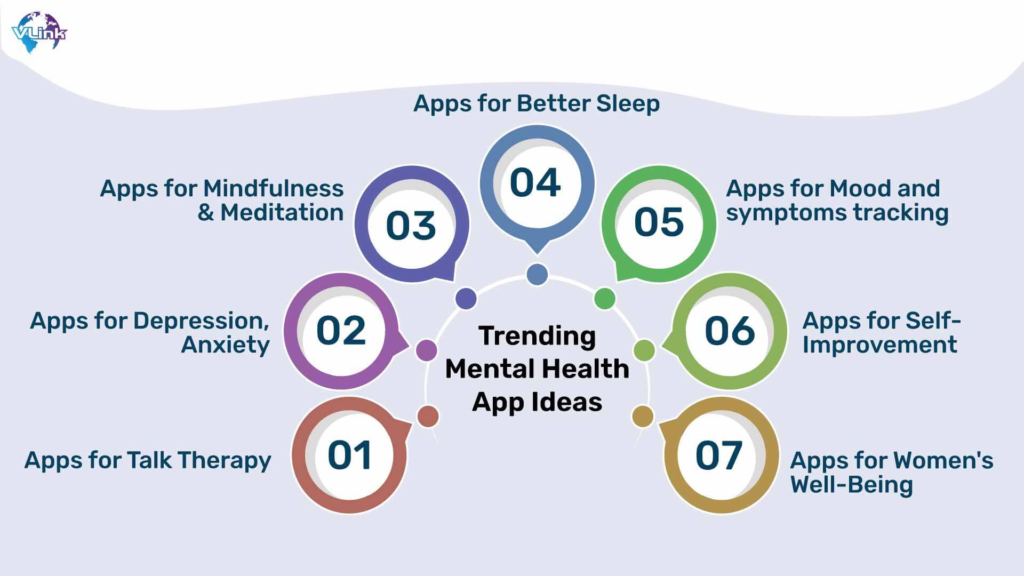Mental health has become a national conversation in the United States, especially after the COVID-19 pandemic. Millions of Americans now seek mental support not just from therapists, but also through their smartphones. The demand for easy, private, and affordable support has pushed mental health apps to the top of app store charts.
From meditation tools to therapy chatbots, these apps are helping users manage anxiety, stress, depression, and burnout. Let’s look at the top 7 mental health apps that are trending across the USA in 2025 and why so many people are turning to them for support.
1. Calm – The Leader in Meditation and Relaxation
Calm continues to dominate the mental wellness space. With its soothing background sounds, daily guided meditations, and sleep stories read by celebrities, Calm is a favorite among Americans.
Key Features:
- Guided meditation for stress and anxiety
- Sleep stories to fight insomnia
- Breathing exercises and calming music
Many users say they sleep better and feel more relaxed within days of using the app. Calm has become a go-to for people who struggle with busy minds and sleepless nights.

2. Headspace – Your Personal Mindfulness Coach
Headspace is another widely downloaded mental health app in the USA. Its fun and friendly design makes mindfulness easy to understand for beginners.
Key Features:
- Short, daily meditation sessions
- Sleep sounds and guided wind-downs
- Focus music for work and study
Headspace is especially popular among working professionals and students who use it during lunch breaks or before bed to stay centered and focused.
3. BetterHelp – Talk to a Real Therapist Anytime
BetterHelp is one of the most downloaded therapy apps in America. It connects users with licensed therapists via chat, video, and voice call—all through your phone.
Key Features:
- 24/7 access to licensed therapists
- Affordable weekly therapy plans
- Private and secure messaging
People who cannot attend traditional therapy sessions due to cost or schedule find BetterHelp to be a flexible solution. It also allows users to switch therapists easily if they’re not satisfied.

4. Moodfit – Track Your Mood and Mental Fitness
Moodfit is like a fitness tracker, but for your mental health. It helps users understand how daily habits impact their mood.
Key Features:
- Daily mood and activity tracking
- Gratitude journals and mental fitness goals
- Breathing and mindfulness tools
Users love Moodfit because it shows patterns over time. For example, it might reveal that exercise or sleep affects your mood more than you think. This self-awareness helps people make better lifestyle choices.
5. Sanvello – All-in-One Mental Health Toolkit
Sanvello combines therapy, self-help, coaching, and community support in one place. Designed by psychologists, this app offers evidence-based techniques for dealing with anxiety and depression.
Key Features:
- CBT (Cognitive Behavioral Therapy) based tools
- Mood tracking and guided journeys
- Peer support community
Sanvello is often recommended by therapists and health insurance providers, making it a trusted choice among users who want expert-backed strategies.
6. Talkspace – Therapy That Fits Busy Schedules
Talkspace offers on-demand therapy with licensed professionals, similar to BetterHelp. Its strength lies in flexibility and privacy.
Key Features:
- Unlimited messaging therapy
- Video therapy with licensed professionals
- Specialized support for teens, couples, and more
Busy Americans love Talkspace for its convenience. You can start a session or message your therapist any time, even during work breaks or from home at night.
7. Happify – Science-Backed Games to Boost Positivity
Happify takes a playful approach to mental health. Instead of therapy or meditation, it uses games and activities based on positive psychology.
Key Features:
- Engaging mental health games
- Activities designed by psychologists
- Tracks happiness and emotional growth
People who dislike traditional meditation or therapy love Happify’s gamified style. It’s ideal for users who want mental support but also like interactive fun.
Why Mental Health Apps Are Booming in the USA
The increase in screen time, remote work, social isolation, and financial stress has made mental wellness a top priority. But access to therapy remains difficult for many due to high costs and shortage of professionals.
Mental health apps offer:
- Affordable alternatives to traditional therapy
- Privacy and convenience from home
- Round-the-clock access to support tools
- Personalized experiences based on user needs
Young adults, students, and working professionals are among the biggest users of these apps. In fact, recent reports show that over 30% of Gen Z and millennials in the US use a mental wellness app regularly.

Are These Apps a Replacement for Therapy?
Not entirely. While these apps provide useful tools and even connect users with therapists, they’re not a full replacement for in-person therapy, especially for serious mental illnesses.
However, they are a great first step toward managing mental health. They help people become more self-aware, track progress, and build positive habits.
Many therapists even recommend these apps to complement regular therapy sessions.
Final Thoughts
Mental health apps are changing how Americans take care of their minds. From guided meditation to real therapy chats, there’s something for everyone—no matter your age, lifestyle, or struggles.
If you’re feeling overwhelmed, stressed, or just looking for more peace in your daily life, one of these seven trending apps could be the support system you need.
Remember, your mental health is just as important as your physical health—and now, help is just a tap away.
Read more :- Top 10 Best American Superfoods That Boost Immunity Naturally






